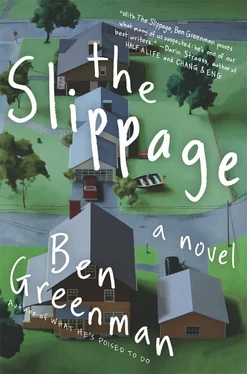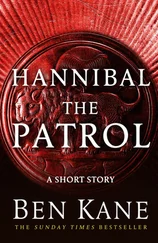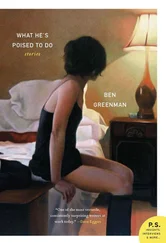He flew out for her funeral within the year, made remarks at her graveside to no real effect, and put a bid in on a house — a modest one-bedroom with a small screened porch on the north side of town. When the Realtor called him to tell him the place was his, he was at his desk at the advertising agency where he worked as a copywriter, and he went to the bathroom and stared at himself in the mirror.
His first night there, he brought a girl over to help him christen the place. The girl was Karla, and she lay down on an air mattress, which was all he had, in her underwear, which was all she had. “Certificate of occupancy,” he said, pointing at the deed, and she laughed and bucked up her hips rakishly. “You may own the house,” she said, “but you’re a renter here.”
Then Louisa, returning to him, had taken him away from all that, into what she insisted was his first true home. He found himself agreeing without feeling any inner snag or catch. Was that love? Now, in the dim afternoon light beneath the clouds that would not rain, she came outside, having forgiven him for the fight of the night before, carrying mugs in both hands as proof.
“Thanks,” he said.
“No problem,” she said. “It’s not very good coffee.” She leaned on the rail. “Looks like the people who bought the Johnson place are finally moving in,” she said. “I saw a man the other day. About our age, short, hairy.”
“A caveman?” he said. “In that case, I would definitely consider getting out of here. Drives down property values.”
“Funny, but not so funny,” she said. “Let me read you something. I was going to read this out at the lot the other day, but I lost my nerve.” She took a piece of paper out of her pocket. “‘We make a pact with another person to follow as far as they go, but we do not really mean it. We mean that we will follow so long as we do not start to feel lost. Love, or what passes for it, is about believing that we are never truly lost.’”
“That’s nice. Who wrote that?”
“I did, in college. I found it the other day during the party.”
“I’m glad you were keeping busy.”
Louisa turned, the paper still in her hand, and he thought she was going to start in on the idea of a new house again. But speculation was running ahead of evidence. She sat down without a word. Adjacent yards supplied the sounds of children.
The next day, he woke early, kissed Louisa good-bye, and made like he was going to work. Instead he drove to the triangular park on the corner of Keeler and Martin, where he sat and watched knives of light pierce the surface of a small lake.
Louisa and William had come to this lake during their first try at love, twenty years before. They passed the time naming ducks, or rather William did, mostly for historical figures. The one in front of the line, looking around imperiously: Churchill. The one in the water, flapping its wings: Archimedes. The one off to the side, tilting its head and considering a family at a picnic table: Albert Einstein. Louisa named them all Duck, and every once in a while pointed excitedly into the middle of the pack and shouted, “Goose!”
He had crisscrossed the town hundreds of times over the years, never with any particular emotion, but now it contained the possibility of loss — or, rather, he saw the possibility of loss that had always been there — and it made him sad. That was the apartment building where, twenty years before, he and Louisa had considered renting a place. That was the tree where he had pretended to carve their initials. That was the Italian restaurant where he had thought to take her during their first relationship, but she had broken up with him and he had never been able to work up the courage. Most of these, he conceded, were somewhat abstract.
He crossed back through town in search of more concrete examples. There was a park bench where Louisa had kissed him roughly. There was a canal where William had, half in jest, thrown a pebble he pretended was his wedding ring. There was the pig on a pole, presiding over discount retail. The theater on Loomis and Bell contained a longer story. A few months after their second first date, he had taken Louisa to see an old film about a young woman from a small town in the Upper Midwest. She took training as a singer, made a striking entrance in a big-city nightclub, fell in love with both a waiter and a captain of industry. Two of the sides of the triangle were shot to death.
Afterward, out on the sidewalk, William seized Louisa’s hand. She wore gloves, which he mocked as an affectation but secretly admired. “What?” she said.
“I have a question,” he said. “You don’t have to answer right away.”
“What is it?”
“Well, you know how you start life alongside everyone else and then, when you’re young, detach from the mainland? You drift out on your little floe. At first it’s exciting. Then it’s scary. Then you look and see that all around you there are other people on floes of their own. They look close to each other, because they’re far from you. If you could get close enough, you would see that they’re all feeling the same terror. But you can’t get close enough.”
“I wish your mouth would shut sometimes,” Louisa said, but when she covered it with hers she made sure it stayed wide open. He woke in the morning to find her sitting on a chair beside his bed, already fully dressed, even down to the gloves, and the morning breeze slowly ballooning the curtains in the bedroom.
“I can’t believe you remembered all that,” Louisa said. She had coaxed him out onto the deck with a bottle of red left over from the party. The sun had just disappeared behind the rear fence, but she had lined up the wrought-iron lanterns on the railing. A big-band song, clarinet in prominence, sailed in from a radio in a neighboring yard. “Who would pick a girl who wears gloves?”
“I would,” he said. “I did.”
“Come here,” she said, but she pulled her chair closer to him. She hid her head in the space beneath his chin and he smelled her hair, now a sugary vanilla, and when she sighed and blew hot breath against his neck he understood that he had miscalculated by telling her about the drive through town. He had wanted it to ignite the same fire in her, but it lit the wrong wick. It had put her in mind of his love for her, not for the neighborhood.
She kissed him on the side of the face, and then on the lips. “I’m heading off.”
William went from deck to garage, tried to exercise a little, stood with barbells in his hands and his full weight pressing down on the soles of his feet. He picked up his guitar, ran his fingers over the body and the neck. There was a scar near the bridge that he wished he had the story for, but it had been there when he bought the thing. So much in the world had happened before he arrived.
Coming through the kitchen, he was stopped by a flicker in the corner of his eye. It was another white plastic bag, handles tied, belly full, in the center of the counter. He dumped the contents out. The first bag, the one in the junk room, had contained June’s mail; the bag in the garage had been May. This had everything they had and then some: notices from professional associations, postcards announcing special offers at local stores, catch-up chronicles from friends they hadn’t seen in years. The invitation to the Kenners’ cocktail party was in there. There were no bills or checks or even subscription renewals — anything of consequence had been removed — but along with the mail there was a strange assortment of objects: a spare key for his car; a baseball cap he had thought was lost forever; a bottle cap that, upon closer inspection, appeared to have been saved from the party they’d thrown for Tom. The collection was at once curated and entirely haphazard.
Читать дальше












